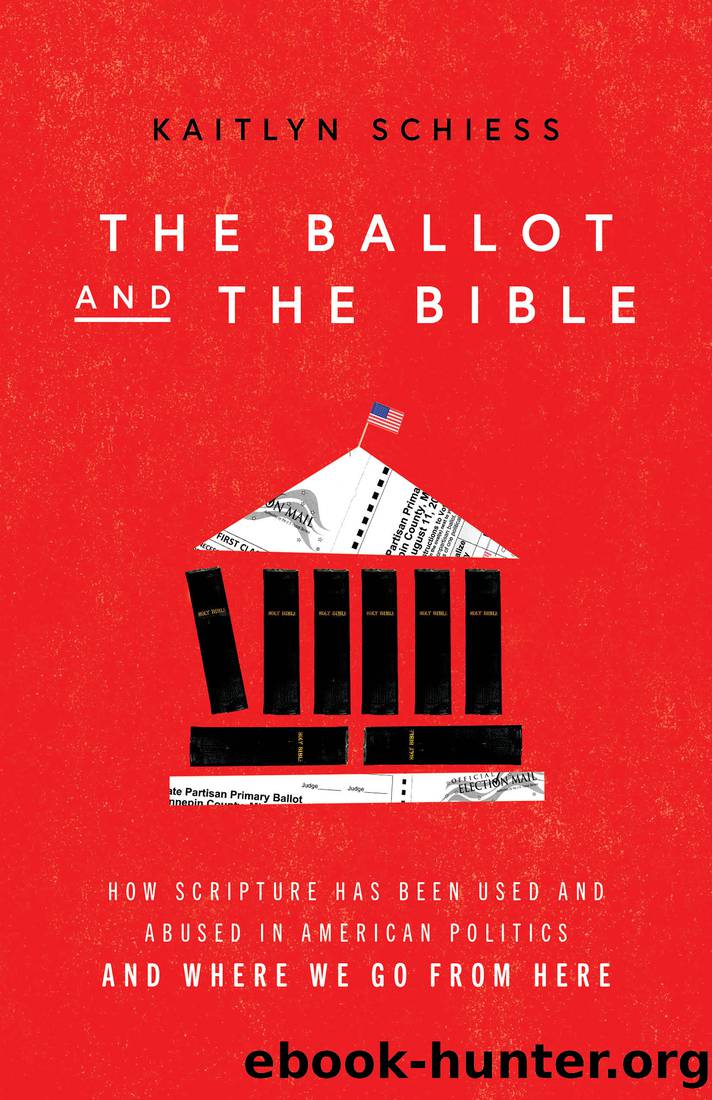The Ballot and the Bible by Schiess Kaitlyn;

Author:Schiess, Kaitlyn;
Language: eng
Format: epub
Tags: Politics/Bible;REL084000;REL012110;REL015000
Publisher: Baker Publishing Group
Published: 2023-06-19T00:00:00+00:00
Themes of Lindseyâs Prophetic Interpretation
The Bible is âdefiniteâ about the roles particular nations will play in the coming cosmic drama. Lindsey argues that it is incredibly important that we map biblical prophecies onto modern-day nations. The data in the biblical text is sufficient for us to understand which nations play which roles in the end times, as long as we apply the right hermeneutical rules.
Scripture is interpreted from a position of American superiority. Lindsey makes derogatory comments about Asian and Middle Eastern nations and peoples, describing them as âbackwardsâ and writing about Islamic head coverings with suspicion.28 In short, Lindsey approaches questions of biblical interpretation with an explicit yet uninterrogated cultural bias (a bias that we will see with more political flair in his later work).
Scripture is a puzzle or riddle to be deciphered. Lindsey insists that he isnât reading current events into the Bible; heâs merely reading the Bible and watching its predictions unfold in real time. While Lindsey does have some evangelistic goals (securing your salvation before the coming crisis), much of the book reads the Bible like a puzzle God knew would stump us. The prophets do not challenge us by drawing attention to our sins or calling us to repentance. Rather, they outline dramatic events that we can puzzle together as informed spectators.
Scripture should be interpreted âliterallyâ (sometimes). Lindsey highly values faithfulness to Scripture. He decries pastors who âexplain awayâ prophecy, and claims to take it seriously and literally. Of course, no one interprets every word of the Bible as if it intends a physical or historical meaning. Even Lindsey says that some parts are figurative and some parts (like the ârevived Roman Empireâ in Daniel 7) must be metaphors because they donât make sense in light of current international affairs. One proponent defined dispensational theology by noting that they âbelieve what the Bible literally teachesâ while their opponents allow for allegorical or spiritual interpretations by which you âcan invent any kind of âinterpretationâ you want.â29
This disdain for allegorical readings of Scripture is itself a problem: there are legitimate concerns about allegorical readings, but to condemn them is to condemn the biblical interpretation of wide swaths of the historic church, including theologians who helped cement the foundational doctrines of the faith against heresies and schisms. Many critics also misrepresent allegorical readings. They do not come from a lack of discipline (theologians work out and argue with each other about the ârulesâ of interpretation), and they do not avoid what the Bible teaches.30 When early Christians read the Old Testament allegorically, they were doing what they saw the apostles who wrote the New Testament doing: seeing in Old Testament passages truths more fully expressed in the New.31
No one reads the Bible entirely literally. The Bible is full of figural language, different genres, and somewhat bizarre cross-references from our perspective (who would have thought to cite Hosea 11:1 as a prophecy about baby Jesus in Egypt?). Most Christians recognize that everyone is making judgments about when to take things in a physical or historical way and when to understand them in a spiritual way.
Download
This site does not store any files on its server. We only index and link to content provided by other sites. Please contact the content providers to delete copyright contents if any and email us, we'll remove relevant links or contents immediately.
| ASVAB | GED |
| GRE | NCLEX |
| PRAXIS | SAT |
| See more | Flash Cards |
| Study Guides | Study Skills |
| Workbooks |
Talking to Strangers by Malcolm Gladwell(13052)
The Compound Effect by Darren Hardy(8662)
Tools of Titans by Timothy Ferriss(8046)
Wonder by R. J. Palacio(7814)
The Lover by Duras Marguerite(7673)
A Court of Wings and Ruin by Sarah J. Maas(7459)
The Circle by Dave Eggers(6936)
Deep Work by Cal Newport(6734)
Kaplan MCAT General Chemistry Review by Kaplan(6733)
To All the Boys I've Loved Before by Jenny Han(5659)
Wiseguy by Nicholas Pileggi(5498)
The Body: A Guide for Occupants by Bill Bryson(4758)
1,001 ASVAB Practice Questions For Dummies by Powers Rod(4390)
Eat That Frog! by Brian Tracy(4295)
Cracking the GRE Premium Edition with 6 Practice Tests, 2015 (Graduate School Test Preparation) by Princeton Review(4116)
Pre-Suasion: A Revolutionary Way to Influence and Persuade by Robert Cialdini(4046)
Barron's AP Biology by Goldberg M.S. Deborah T(4014)
ACT Math For Dummies by Zegarelli Mark(3896)
Kaplan MCAT Organic Chemistry Review: Created for MCAT 2015 (Kaplan Test Prep) by Kaplan(3863)
